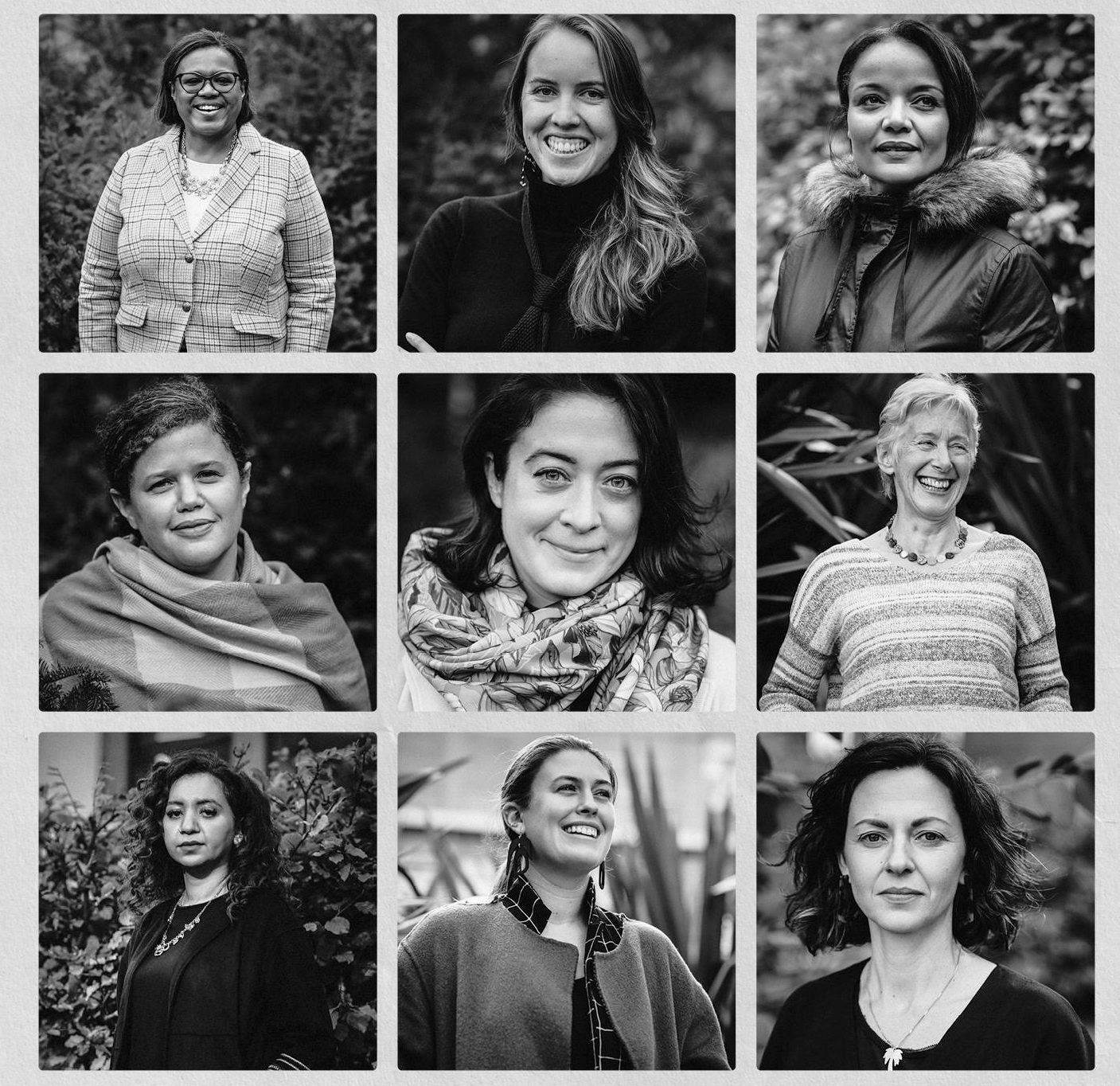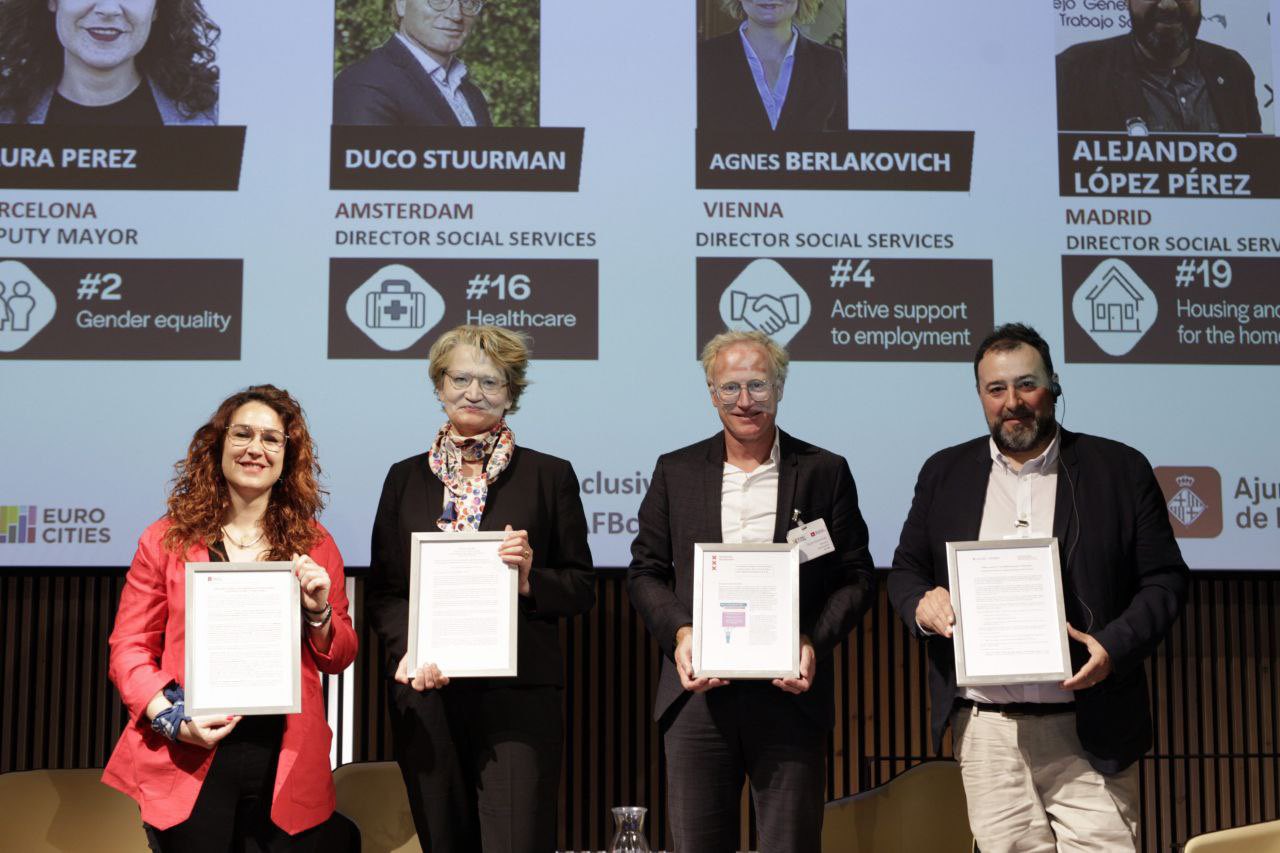Reading Time: 10 minutes
Towards more inclusive cities
Rising inflation and rocketing energy prices are the most pressing challenges cities and local people face. This economic situation has further exposed vulnerable low- and middle-income households to unaffordable living costs while aggravating social disparities.
As confirmed by the results of the Eurocities Pulse Mayors Survey, fighting inequalities, implementing an economic recovery that works for everyone, and working on a smooth energy transition are among the top challenges for mayors in 2023.
Energy poverty, which has been increasingly recognised as a factor impacting people’s quality of life, is a condition where individuals or households lack access to affordable and reliable energy services. These challenges can be mitigated through diverse actions by public administrations that are aligned with the principles of a fair green transition, which therefore minimises negative impacts on the most vulnerable groups.
Rising inflation and rocketing energy prices are the most pressing challenges cities and local people face. This economic situation has further exposed vulnerable low- and middle-income households to unaffordable living costs while aggravating social disparities.
As confirmed by the results of the Eurocities Pulse Mayors Survey, fighting inequalities, implementing an economic recovery that works for everyone, and working on a smooth energy transition are among the top challenges for mayors in 2023.
Energy poverty, which has been increasingly recognised as a factor impacting people’s quality of life, is a condition where individuals or households lack access to affordable and reliable energy services. These challenges can be mitigated through diverse actions by public administrations that are aligned with the principles of a fair green transition, which therefore minimises negative impacts on the most vulnerable groups.
Tackling the unaffordable cost of living
Many cities work with social economy actors, local people, and academia to tackle energy poverty and inequalities while implementing climate actions. Other cities are setting long-term holistic strategies and implementing policies to foster healthy, energy-efficient, circular, and economically diversified urban environments.
For example, in 2022 Barcelona initiated a pilot project to offer free solar energy to low-income families from photovoltaic pergolas installed in public spaces. Meanwhile, Ghent introduced the social coach, a professional who helps households and homeowners understand technical reports and find financial and other solutions. And Bilbao is providing advice and support to members of the community throughout the renovation journey of their apartment buildings.
Across Europe, poverty remains a significant urban challenge. Many individuals, including young people, are at risk of experiencing homelessness. Cities are working both to increase prevention measures as well as trying to find long-term solutions to ensure that fewer people end up in this situation. This is similarly reflected in the results of the Eurocities Pulse Mayors Survey, given that finding adequate solutions to housing all residents was listed as mayors’ fifth priority overall for 2023.
A proof of their commitment is the active engagement of the cities in the European Platform on Combatting Homelessness. The mission is to make sure that all stakeholders (different levels of government, NGOs, etc.) work effectively together to end this dire social challenge. To ensure the continuous and impactful work of cities towards homelessness prevention, EU funding and financing opportunities need to be both accessible at the local level, and better reflect the realities of different local contexts so that cities are better able to use them.
Cities’ social trends paper on childcare provision
European cities face a series of challenges concerning accessibility, availability, affordability and quality of early child education and care, such as a lack of legal entitlement in some countries, unequal distribution of childcare places in the city, insufficient government co-funding when demand for education in cities increases, and staff shortages.
However, cities offer solutions. At the child level, cities provide extra support for active social inclusion of disadvantaged children, such as those with disabilities and special needs, as well as migrants and non-native speakers. At the parental and family level, cities introduce special subsidies, provide family counselling and family assistance services, in addition to encouraging active parent participation in cultural and other activities. At the team and staff level, cities offer training programmes and work to improve the skills of pedagogical staff, managing education centres and ensuring quality control in educational facilities.

The right to age healthily
In the future, poverty could become an even more pressing issue, as projections suggest that the number of people aged 65 and over will have risen to 24% by 2050. Additionally, the ratio of working age individuals to those aged 65 or over is expected to be less than two to one. These estimations raise common challenges for municipalities, whose populations are ageing faster than the national averages.
In some cities, the ageing of the baby boomer generation (1946-64) has increased the total number of people over 80 at a faster rate than other age groups. Local governments, therefore, try to reflect the increased demand for services and improve the quality of life of the elderly by adjusting physical and social environments and improving long-term care facilities.
This situation is aggravated in cities due to the concentration of diverse, vulnerable groups. The most disadvantaged groups, such as economically and socially excluded people, the homeless, migrants (non-EU nationals) and Roma, tend to be represented in higher numbers in urban contexts, where they struggle to access healthcare, even though they are the ones most in need of these services.
The more prominent factors are the difficult working conditions and low salaries. The shortage of carers is most acute in cities with higher living costs where wages in the care sector are not adjusted, and long-term care is seen as the least attractive of care sectors, which negatively impacts the quality of its delivery.
Long-term care has a marked gender dimension too: most care workers in the formal and informal sectors are women. Finally, the caregiver shortage and lack of nursing home places have made some cities inclined to pursue a model encouraging long-term care services at home, which constitutes another challenge.
The European Commission launched the European Care Strategy in September 2022, which aims to ensure quality, affordable and accessible care services and improve the situation for both care receivers and the people caring for them. The European Care Strategy can help cities to navigate the increasing demands on childcare and long-term care.
Today, big and medium-sized cities can be a social driving force. Social matters are also related to other issues such as ecology and sustainable development. These are substantial challenges that we must tackle at different levels if we want to preserve our planet in the years to come.
– Abbassia Hakem, Deputy Mayor of Nantes
Cities social trend paper on gender equality
The Eurocities cities’ social trends report on gender equality found that two in three cities mainstream gender equality in their policies via a dedicated strategy or action plan. Barcelona adopted the ‘Strategy against the feminisation of poverty and deprivation 2016–2024’ to reduce poverty among women and include a cross-sectoral approach to gender equality in all local measures.
Lille Metropolitan Area adopted its ‘Gender equality strategy for 2016-2020’ to include a gender-based approach in all its policies, and Vienna introduced gender budgeting in all programmes. Additionally, many cities partner with local employers and NGOs to promote gender equality by using gender clauses in public procurement.
Cities are setting up centres to support victims of gender-based violence, as well as anti-discrimination offices in cooperation with equality bodies. But just as importantly, cities are investing in capacity building and raising public awareness. To tackle gender-based stereotypes in the labour market and society, Vienna produced a toolkit for educators to work with young children in early childhood education and care based on a gender-sensitive pedagogy.

The right to work
Minimum income schemes aim to benefit individuals whose incomes are insufficient to meet their basic needs. While minimum income is typically a national competency, many local social services have found themselves particularly stretched in an effort to cover the gaps in minimum income schemes.
However, the national policy debates regarding the reform of minimum income schemes have not adequately included cities. This has resulted in a lack of attention to the specific gaps and challenges that cities face in reducing poverty.
In addition, programmes related to digital skills, education and training are a competence shared with national governments for most cities. In today’s increasingly digital world, digital skills are becoming essential for individuals to participate fully in the economy and society. The involvement of cities in digital skills development is related not only to their competitiveness, but also to ensuring that they have a skilled workforce and that all local people have access to resources and opportunities to participate fully in urban life.
Given the crucial role of digital skills for employment and social inclusion, cities prompt national governments and the EU to ensure that digital skills education begins early to promote digital inclusion for all. To achieve this, schools should also have the appropriate equipment, and teachers must have better access to training. Similarly, the digital gap should be reduced by ensuring connectivity in the poorest neighbourhoods, such as through access to free Wi-Fi.
Inclusive cities for all
In conclusion, given the multitude of social and economic challenges that arise at the local level, it is essential for cities to be involved in preventing and mitigating their negative impact. Local governments are determined to build more inclusive urban environments based on fairness, equality and inclusivity, and with that goal, they are allies of the European Commission in promoting the European Pillar of Social Rights.
To date, 45 European municipalities have pledged to uphold the principles of this pillar via Eurocities’ Inclusive Cities For All political initiative. This demonstrates their joint efforts with diverse partners and all levels of government to improve the lives of their populations. For example, their commitment can be seen in their pledges to principles 14 (minimum income), 18 (long-term care), 19 (assistance to the homelessness), and 4 (active support to employment).
However, to accomplish this goal effectively, municipalities need access to sufficient financial and human resources, robust capacities and expertise, and established collaboration channels with a diverse range of stakeholders. This should also involve the participation of vulnerable groups and individuals in decision making, as well as developing and implementing policies and measures.
Inequalities in income, health and quality of life persist and in some parts of Glasgow are widening. There are specific concerns regarding the health and wellbeing of population groups such as lone parents, children and young people in low-income families and frail, isolated older people. There are also growing concerns about mental health and wellbeing across all age groups.
– Bailie Annette Christie, Convener for Wellbeing, Empowerment, Community & Citizen Engagement at the Glasgow Municipality.
The InclusiveCities4All initiative
Eurocities political initiative ‘Inclusive Cities for All’ kicked off in early 2019 with 21 cities presenting pledges at the European Parliament. Cities in the initiative show political commitment to engage in the European Pillar of Social Rights. Since then, the initiative has gone from strength to strength, with 45 cities to date showing their commitment to a more cohesive and inclusive Europe.
Pledges become an opportunity to bring local efforts to the European spotlight and showcase the important role of cities in the implementation of the social agenda at the local level. Eurocities is determined to build a fairer, more equal and inclusive Europe with inclusive cities for all. Through their pledges, Eurocities members show that they can work with all partners and all levels of government to do what is best for their citizens.

